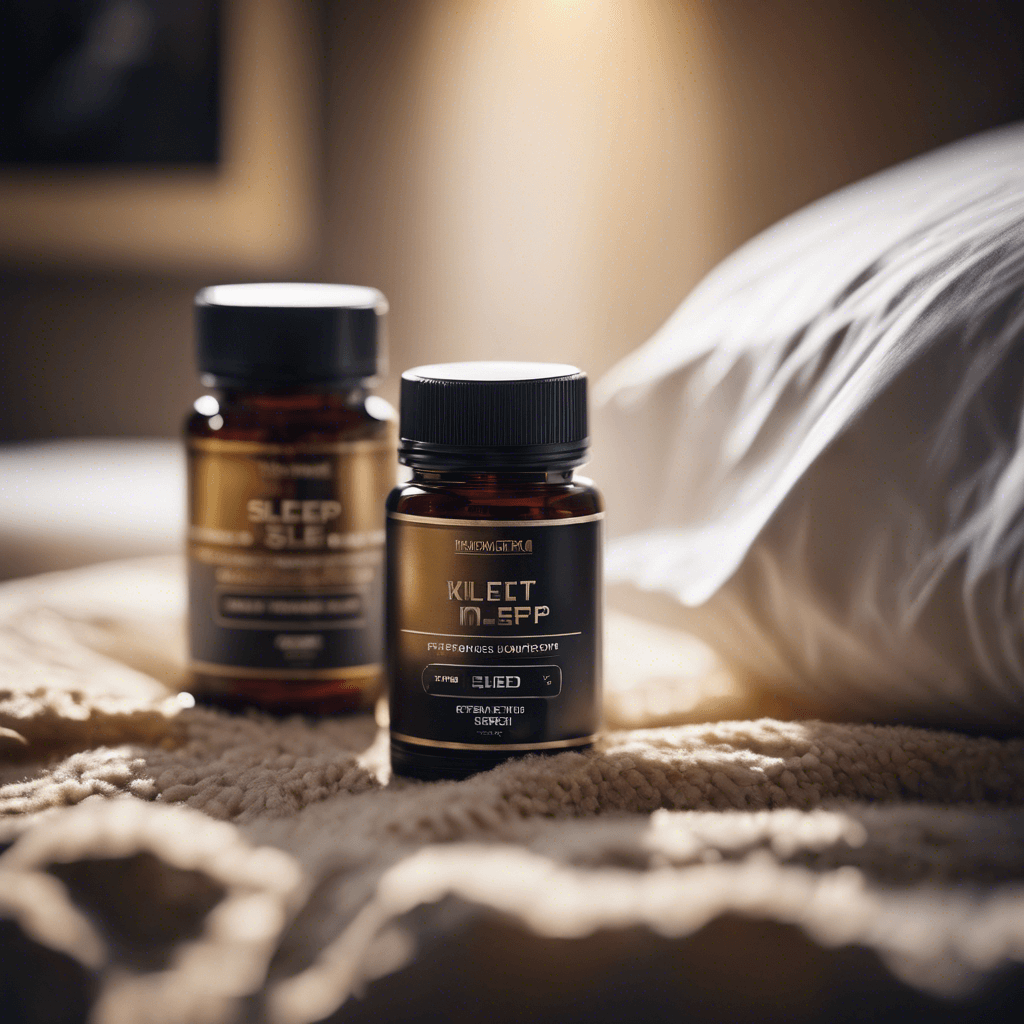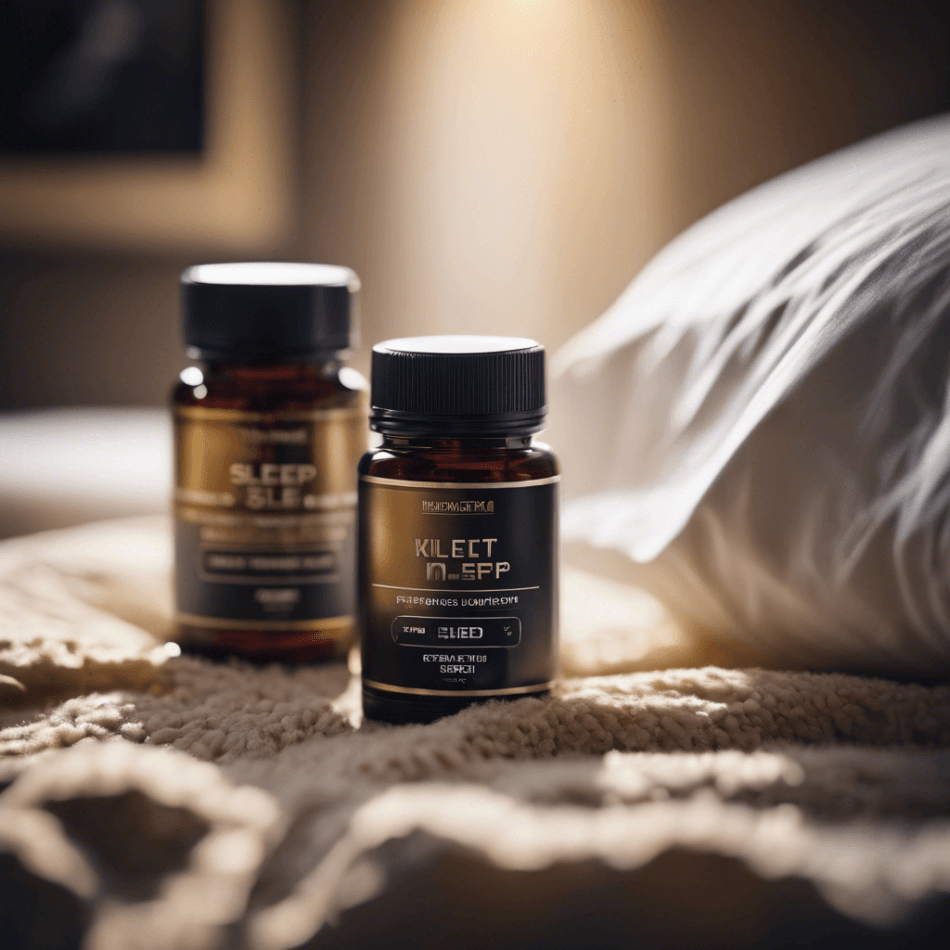Explore some of the best sleep supplements on the market that can aid in promoting a good night’s sleep.
Get the Best Night’s Sleep with These Top Sleep Supplements
If you’re struggling to get a good night’s sleep, you’re not alone. In today’s fast-paced world, stress, anxiety, and other factors often leave us tossing and turning in bed, unable to achieve the restful sleep our bodies need. Fortunately, there are sleep supplements available that can help you improve your sleep quality and wake up feeling refreshed and energized. Here, we will explore some of the best sleep supplements on the market that can aid in promoting a good night’s sleep.
Melatonin: Regulate Your Sleep Cycle Naturally
Melatonin is a hormone naturally produced by the pineal gland in our brains. It regulates our sleep-wake cycle and helps us fall asleep faster and stay asleep longer. If you’re struggling with insomnia or jet lag, melatonin supplements can be highly beneficial. Taking melatonin before bedtime can signal your body that it’s time to sleep and improve your overall sleep quality.
L-Theanine: Relaxation and Stress Relief
L-Theanine is an amino acid commonly found in teas, particularly green tea. It has been shown to promote relaxation and reduce anxiety levels, making it an excellent sleep supplement. By calming the mind and reducing stress, L-Theanine can help you achieve a more peaceful and restful sleep. Additionally, L-Theanine does not cause drowsiness during the day, making it a safe option for those who want to enhance their sleep without compromising their daytime productivity.
Valerian Root: Nature’s Sedative
Valerian root is a herb native to Europe and Asia that has been used for centuries as a natural sedative and sleep aid. It helps increase GABA levels in the brain, a neurotransmitter that promotes relaxation and reduces anxiety. Valerian root supplements can improve sleep quality, reduce the time it takes to fall asleep, and alleviate insomnia symptoms. If you’re looking for a natural alternative to traditional sleep aids, valerian root is worth considering.
Chamomile: Soothe Your Mind and Body
Chamomile is a well-known herbal tea that has been used for centuries as a remedy for insomnia and other sleep disorders. It contains apigenin, an antioxidant that binds to certain receptors in the brain and promotes sleepiness. Chamomile tea or chamomile supplements can help calm your mind and body before bedtime, making it easier to fall asleep and enjoy a restful night’s sleep. Additionally, chamomile has anti-inflammatory properties, which can further contribute to overall wellness.
Magnesium: Relax Muscles and Unwind
Magnesium is a mineral essential for numerous bodily functions, including relaxation and sleep. It helps regulate neurotransmitters in the brain, such as GABA, which play a crucial role in promoting sleep. Magnesium supplements can aid in muscle relaxation, reduce anxiety, and improve sleep quality. If you often experience muscle cramps or restless legs syndrome that disrupt your sleep, magnesium could be the solution you’ve been looking for. Magnesium is typically taken in pill form, ideally before bedtime. Excessive intake can promote a deeper sleep but may also lead to overly relaxed bowels, potentially resulting in fluid loss.
5-HTP: Boost Serotonin for Better Sleep
5-HTP is a compound naturally produced by the body that helps produce serotonin, also known as the “feel-good” hormone. By increasing serotonin levels in the brain, 5-HTP can promote relaxation, improve mood, and enhance sleep quality. If you struggle with insomnia or restless sleep patterns, 5-HTP supplements may be beneficial in regulating your sleep-wake cycle and promoting a more restful sleep experience.
Sodium deficiency: Hyponatremia
While sodium deficiency is not typically associated with insomnia, and is very unusual, it is essential to acknowledge that an imbalance of electrolytes, including sodium, can have profound effects on various bodily functions, potentially leading to disruptions in sleep patterns. Let’s delve into the intricate relationship between sodium levels and sleep. Sodium is a crucial electrolyte that plays a vital role in maintaining fluid balance, nerve function, and cellular homeostasis.
When the body experiences a sodium deficiency, it can lead to a condition known as hyponatremia. In hyponatremia, the concentration of sodium in the blood becomes abnormally low, potentially causing an array of symptoms. One of the key consequences of hyponatremia is the disruption of neurological functions. Sodium is essential for transmitting nerve signals, and a deficiency can impair this process.
This neurological interference might manifest in symptoms such as confusion, lethargy, and in severe cases, seizures. While insomnia is not a direct symptom of sodium deficiency, the neurological disturbances associated with hyponatremia could indirectly impact sleep patterns.
During sleep, the body’s ability to regulate circadian rhythms and transition through sleep cycles relies on intricate communication between various neurotransmitters and hormones. Sodium, as a fundamental component in this intricate system, indirectly influences the balance of neurotransmitters like serotonin and melatonin, both of which are crucial for regulating sleep-wake cycles.
Moreover, sodium plays a role in maintaining blood pressure, and in fact too much of it might raise your blood pressure over time, however its deficiency, may lead to a drop in blood volume. This reduction in blood volume triggers the release of stress hormones like cortisol and adrenaline, which can create a heightened state of alertness and arousal, making it challenging to relax and fall asleep.
Picture this scenario: your body, grappling with low sodium levels, is struggling to transmit nerve signals effectively. The delicate dance of neurotransmitters involved in sleep regulation becomes disrupted, leading to a state of heightened alertness. As your body attempts to compensate for the sodium deficiency, stress hormones surge, creating an environment that is far from conducive to a restful night’s sleep.
Incorporating Sleep Supplements into Your Routine
When incorporating sleep supplements into your routine, it’s important to remember that everyone’s sleep needs are unique. It’s best to start with the lowest effective dose and gradually increase if necessary. Additionally, it’s always a good idea to consult with a healthcare professional before adding any new supplements to your regimen, especially if you have any underlying health conditions or are taking medications.
Here are some tips for maximizing the benefits of sleep supplements:
- Create a sleep-friendly environment: Ensure your bedroom is dark, quiet, and at a comfortable temperature to promote optimal sleep conditions.
- Establish a bedtime routine: Engage in relaxing activities before bed, such as reading a book or taking a warm bath, to signal to your body that it’s time to wind down.
- Limit caffeine and electronic device use: Avoid consuming caffeine and using electronic devices close to bedtime, as they can disrupt your sleep patterns.
- Avoid heavy meals and exercise before bed: Eating a heavy meal or engaging in vigorous exercise too close to bedtime can interfere with your sleep quality.
- Practice stress management techniques: Incorporate stress management techniques into your daily routine, such as meditation or deep breathing exercises, to help calm your mind and promote better sleep.
Finding the best sleep supplement for your needs can significantly improve your sleep quality and overall well-being. Whether you opt for melatonin, L-Theanine, valerian root, chamomile, magnesium, or 5-HTP, these supplements can help regulate your sleep cycle, promote relaxation, and reduce insomnia symptoms. Remember to consult with a healthcare professional before starting any new supplement regimen, and prioritize creating a sleep-friendly environment and establishing a bedtime routine for optimal sleep results. Sleep well and wake up feeling rejuvenated!














